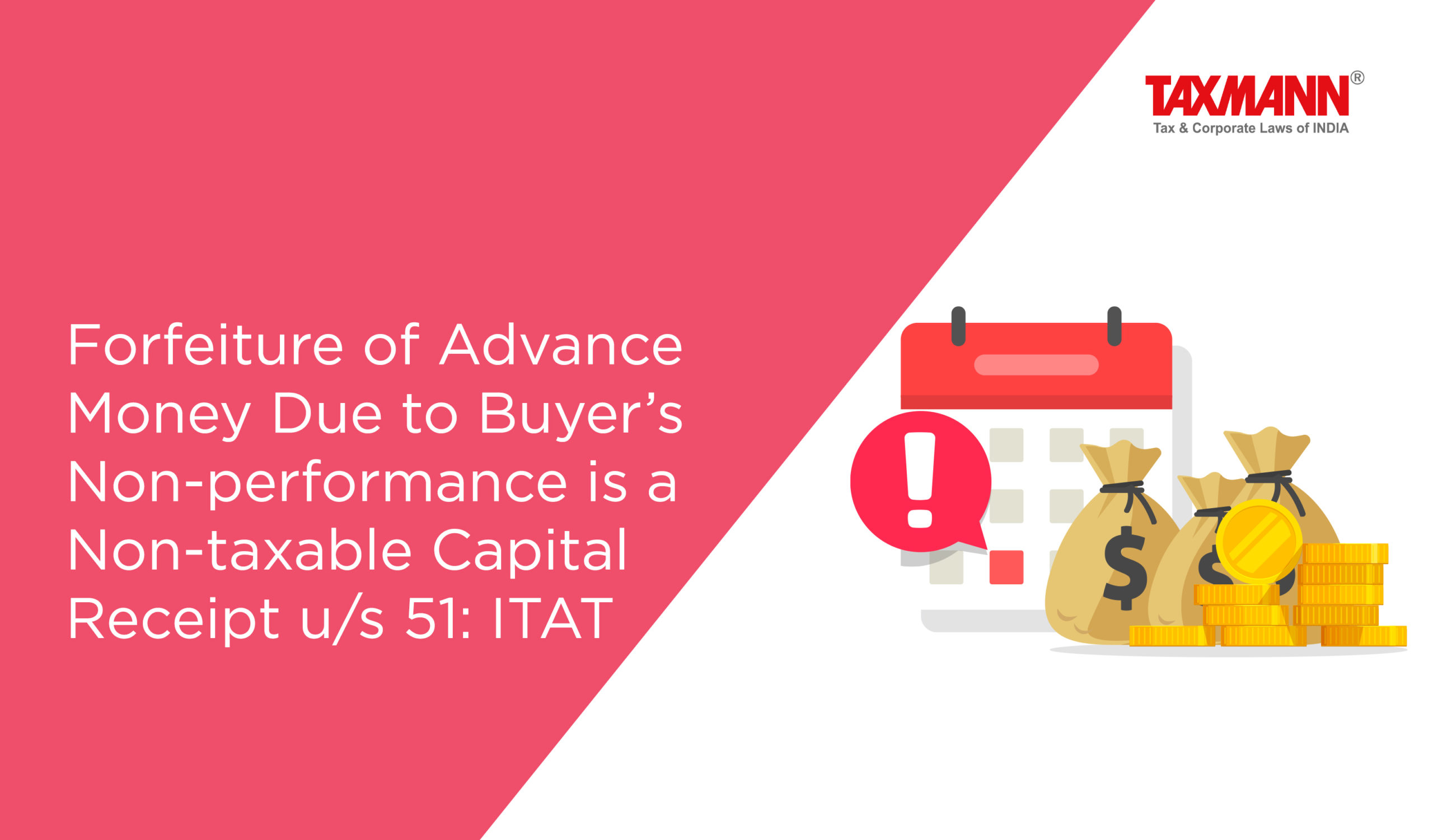Forfeiture of Advance Money Due to Buyer’s Non-performance is a Non-taxable Capital Receipt u/s 51: ITAT
- News|Blog|Income Tax|
- 2 Min Read
- By Taxmann
- |
- Last Updated on 19 July, 2023

Case Details: ACIT v. Ahmad Ansari Imtiyaz - [2023] 152 taxmann.com 36 (Delhi-Trib.)
Judiciary and Counsel Details
-
- B.R.R. Kumar, Accountant Member & Yogesh Kumar US, Judicial Member
- Kanv Bali, Sr. Dr. for the Appellant.
- Ms Prem Lata Bansal, Sr. Adv. for the Respondent.
Facts of the Case
Assessee, an individual, entered into an agreement to sell property comprised of a land and factory building with a company for a total sale consideration of Rs. 25 crores and received Rs. 6 crores as advance sale consideration by way of bank demand draft. However, the buyer failed to pay the balance sale consideration even after issuing a legal notice. The assessee forfeited the advance money received and claimed the same as capital receipt.
Assessing Officer (AO) opined that section 51 provides for the taxation of advance money forfeited to the extent of the property’s acquisition cost. Taxability of excess money received by the assessee over and above the cost of acquisition or Witten Down Value (WDV), as the case may be, was neither covered under section 51 nor covered under the head “salary” or “profit & gains of business or profession.” Accordingly, AO assessed such sum under the head income from other sources.
ITAT Held
The Tribunal held that the amount of Rs. 6 crores received by the assessee would not fall within the ambit of section 56(2). Money has been received in pursuance of the agreement to sell, which could not be materialized due to the non-performance of the contract by the buyer. Therefore, it cannot be said that the assessee received the amount without consideration.
Income from other sources chargeable in section 56 does not provide taxation of forfeited capital receipt till the assessment year 2014-15. Provisions of section 51 would come into play in these circumstances as it specifically covers this type of transaction; once the transaction had been held to be genuine, there is no question of the transaction being without any consideration to invoke provisions of section 56(2)(vi).
AO never doubted the transaction’s genuineness, and no deficiencies were found in the agreement to sell. The assessee received the sale consideration via a demand draft from the bank. Without any contradictory evidence, it can be concluded that the transaction and the buyer’s authenticity have been proven.
Therefore, the said additions are required to be deleted.
List of Cases Reviewed
-
- Commissioner of Agricultural Income-tax v. Kailas Rubber & Co. Ltd. [1966] 60 ITR 435 (SC) (para 13)
- Travencore Rubber & Tea Co. Ltd. v. CIT [2000] 109 Taxman 250/243 ITR 158 (SC) (para 14)
- CIT v. Meera Goyal [2013] 30 taxmann.com 128/214 Taxman 298/[2014] 360 ITR 346 (Delhi) (para 15) followed
Disclaimer: The content/information published on the website is only for general information of the user and shall not be construed as legal advice. While the Taxmann has exercised reasonable efforts to ensure the veracity of information/content published, Taxmann shall be under no liability in any manner whatsoever for incorrect information, if any.

Taxmann Publications has a dedicated in-house Research & Editorial Team. This team consists of a team of Chartered Accountants, Company Secretaries, and Lawyers. This team works under the guidance and supervision of editor-in-chief Mr Rakesh Bhargava.
The Research and Editorial Team is responsible for developing reliable and accurate content for the readers. The team follows the six-sigma approach to achieve the benchmark of zero error in its publications and research platforms. The team ensures that the following publication guidelines are thoroughly followed while developing the content:
- The statutory material is obtained only from the authorized and reliable sources
- All the latest developments in the judicial and legislative fields are covered
- Prepare the analytical write-ups on current, controversial, and important issues to help the readers to understand the concept and its implications
- Every content published by Taxmann is complete, accurate and lucid
- All evidence-based statements are supported with proper reference to Section, Circular No., Notification No. or citations
- The golden rules of grammar, style and consistency are thoroughly followed
- Font and size that’s easy to read and remain consistent across all imprint and digital publications are applied



 CA | CS | CMA
CA | CS | CMA
